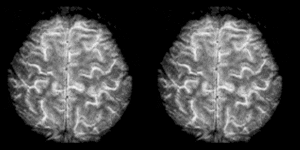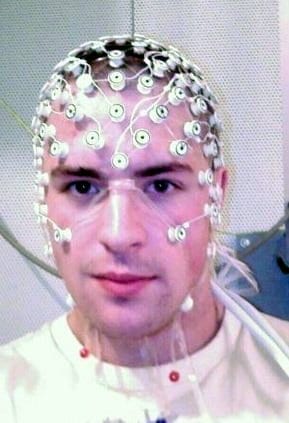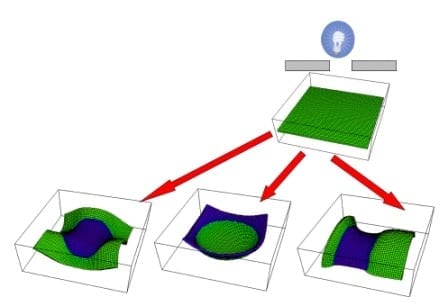
Scientists haven’t yet found a way to mend a broken heart, but they’re edging closer to manipulating memory and downloading instructions from a computer right into a brain.
Researchers from the Riken-M.I.T. Center for Neural Circuit Genetics at the Massachusetts Institute of Technology took us closer to this science-fiction world of brain tweaking last week when they said they were able to create a false memory in a mouse.
The scientists reported in the journal Science that they caused mice to remember receiving an electrical shock in one location, when in reality they were zapped in a completely different place. The researchers weren’t able to create entirely new thoughts, but they applied good or bad feelings to memories that already existed.
“It wasn’t so much writing a memory from scratch, it was basically connecting two different types of memories. We took a neutral memory, and we artificially updated that to make it a negative memory,” said Steve Ramirez, one of the M.I.T. neuroscientists on the project.
It may sound insignificant and perhaps not a nice way to treat mice, but it is not a dramatic leap to imagine that one day this research could lead to computer-manipulation of the mind for things like the treatment of post-traumatic stress disorder, Mr. Ramirez said.
Technologists are already working on brain-computer interfaces, which will allow us to interact with our smartphones and computers simply by using our minds. And there are already gadgets that read our thoughts and allow us to do things like dodge virtual objects in a computer game or turn switches on and off with a thought.
But the scientists who are working on memory manipulation are the ones who seem to be pushing the boundaries of what we believe is possible. Sure, it sounds like movie fantasy right now, but don’t laugh off the imagination of Hollywood screenwriters; sometimes the movies can be a great predictor of things to come.
In the movie, “Eternal Sunshine of the Spotless Mind,” a character played by Jim Carrey uses a service that erases memories to wipe his brain of his former girlfriend, played by Kate Winslet.
But it seems the movie’s screenwriter, Charlie Kaufman, was selling science short.
“The one thing that the movie “Eternal Sunshine of the Spotless Mind” gets wrong, is that they are erasing an entire memory,” said Mr. Ramirez of M.I.T. “I think we can do better, while keeping the image of Kate Winslet, we can get rid of the sad part of that memory.”
Hollywood and science-fiction writers, of course, have had fun with memory manipulation over the years.
In the film “Total Recall,” which is based on a short story by Philip K. Dick, a character played by Arnold Schwarzenegger receives a memory implant of a fake vacation to Mars. In “The Matrix,” characters can download new skills like languages or fighting techniques to their mind, much like downloading a file to a computer.
Far-fetched? Perhaps, and we’re not yet fighting our robot overlords as the humans were in “The Matrix,” but researchers really are exploring ways to upload new information to the brain.
In 2011, scientists working in collaboration with Boston University and A.T.R. Computational Neuroscience Laboratories in Kyoto, Japan, published a paper on a process called Decoded Neurofeedback, or “DecNef,” which sends signals to the brain through a functional magnetic resonance imaging machine, or FMRI, that can alter a person’s brain activity pattern. In time, these scientists believe they could teach people how to play a musical instrument while they sleep, learn a new language or master a sport, all by “uploading” information to the brain.
The Latest Bing News on:
Computer-Brain Interfaces
- Brain Computer Interface Market Deciphering Consumer Decision-Making the Role of Ethnography Techniqueson April 25, 2024 at 3:27 pm
Request To Download Free Sample of This Strategic Report @- Brain Computer Interface Market is valued approximately at USD $ billion in 2019 and is anticipated to grow with a healthy growth rate of ...
- China develops Neuralink rival for brain computer interface techon April 25, 2024 at 8:14 am
C hinese company Beijing Xinzhida Neurotechnology unveiled a brain computer interface (BCI) implant to rival Elon Musk's Neuralink at the 2024 Zhongguancun Forum (ZGC Forum).
- WVU RNI takes part in groundbreaking research on brain-computer interface device for people with neurological disabilitieson April 20, 2024 at 4:20 pm
Researchers at WVU’s Rockefeller Neuroscience Institute are part of a team exploring cutting-edge technology to help people with neurological injuries and disabilities function and communicate. ...
- Brain-computer interface research reaches new frontierson April 19, 2024 at 7:02 am
Brain-computer interfaces may seem like a science fiction concept, but multiple studies are working to make this technology a reality.
- MIT Technology Reviewon April 18, 2024 at 5:00 pm
In the world of brain-computer interfaces, it can seem as if one company sucks up all the oxygen in the room. Last month, Neuralink posted a video to X showing the first human subject to receive ...
- We Finally Know Where Neuralink’s Brain Implant Trial Is Happeningon April 18, 2024 at 2:32 pm
After months of secrecy, Neuralink revealed that the partner site for its brain implant study is the Barrow Neurological Institute.
- When technology can read your brain waves, who owns your thoughts?on April 18, 2024 at 10:34 am
Though the technology like this is still relatively nascent, neural rights activists and cornered lawmakers want to be ready for when it is more widespread. Critics warn companies may already possess ...
- Brain Computer Interface Market Gains Momentum: Forecasted to Reach USD 10.65 Billion by 2033on April 16, 2024 at 1:45 am
According to projections, the Global Brain Computer Interface Market is anticipated to achieve a valuation of approximately USD 10.65 Billion by the year 2033. This growth trajectory signifies a ...
- OPINION: What is a brain-computer interface, and will you eventually have one?on April 15, 2024 at 1:57 pm
Once material for dystopian novels, the brain-computer interface world is now a possible reality that could be here sooner than expected. Companies have been making large strides with spearheads like ...
- New brain-computer interface lets users game with their mindson April 14, 2024 at 9:00 am
Every brain is unique, just like a fingerprint. Traditional brain-computer interfaces require extensive calibration for each individual user. This involves a lengthy process of mapping brain activity ...
The Latest Google Headlines on:
Computer-Brain Interfaces
[google_news title=”” keyword=”Computer-Brain Interfaces” num_posts=”10″ blurb_length=”0″ show_thumb=”left”]
The Latest Bing News on:
Decoded Neurofeedback
- Dorm rooms decoded: a guide to uphill housing at Tuftson April 25, 2024 at 5:00 pm
After a year's experience with college dormitories and hopefully with a compatible roommate in mind, many freshmen have high aspirations for attaining "the perfect room" for their sophomore year.
- Taylor Swift Wears a Wedding Gown and a 'Victorian Mourning' Dress in 'Fortnight' Video: Every Style Clue Decodedon April 19, 2024 at 10:30 am
The singer has also been dropping outfit Easter eggs for months Catherine Santino is a Style Writer-Reporter at PEOPLE. She began as a contributor for PEOPLE in 2022 and joined the staff full-time ...
- Baccarat decoded: Strategies for real money baccarat onlineon April 16, 2024 at 4:41 am
Baccarat, a well-loved table game that has long captivated casino players for centuries in casinos worldwide, is now accessible from the comfort of your home, owing to online casinos MI. Most, if ...
- We Decoded the Thrilling Premiere of 'The Sympathizer'on April 14, 2024 at 5:00 pm
Television has taught us a lot about Asiatic history lately, hasn't it? FX's Shōgun sent audiences back in time to 17 th-century Japan. Netflix's 3 Body Problem begins during China’s Cultural ...
- Find a Neurofeedback Therapiston March 21, 2024 at 7:46 pm
Who is qualified to practice neurofeedback? Trained mental health professionals—including psychologists, psychiatrists, and clinical social workers—may provide neurofeedback, typically in ...
- Interior Designs Decoded: Unwind in a captivating courtyardon December 20, 2023 at 4:49 pm
Let take a look at some tips to unwind in a courtyard: * If a courtyard is just a pathway from place to place, make a modern path of slab paving stones across the wild bush. * Create concrete ...
- Neurofeedback Therapists in Minnesotaon September 28, 2023 at 2:20 am
I use Cognitive Behavior Therapy, biofeedback and neurofeedback to help people , including reducing or eliminating the need for medications. I work with Liz Nash, MA, LMFT, AT-RBC and Brenda ...
- New brain-scanning technique could transform psychiatric treatmentson August 2, 2023 at 6:28 am
Called decoded neurofeedback (DecNef), and developed by a team led by Mitsuo Kawato of the Advanced Telecommunications Research Institute International (ATR) in Kyoto, Japan. It combines machine ...
- The Information in DNA Is Decoded by Transcriptionon November 17, 2021 at 2:16 am
DNA is essentially a storage molecule. It contains all of the instructions a cell needs to sustain itself. These instructions are found within genes, which are sections of DNA made up of specific ...
- 30 of the Most Common Gen Z Slang Words, Decodedon April 29, 2021 at 7:03 am
No worries—we've put together an alphabetical list of some of the most common Gen Z slang terms and decoded them to keep you in the know. Meaning: A word to describe someone who likes mainstream ...
The Latest Google Headlines on:
Decoded Neurofeedback
[google_news title=”” keyword=”Decoded Neurofeedback” num_posts=”10″ blurb_length=”0″ show_thumb=”left”]










